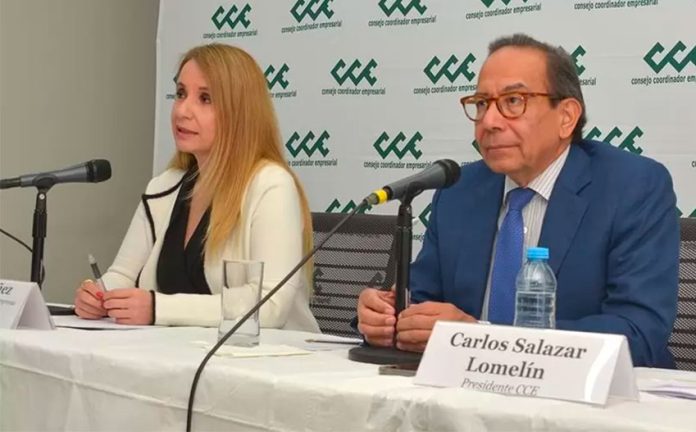The leaders of two influential business groups took aim at the federal government on Wednesday, declaring that hostile discourse and policy changes that are friendlier to the state than private enterprise are scaring away foreign investment.
At an event in Mexico City, the president of the Executive Council of Global Companies (CEEG) told a press conference that the business community is “deeply concerned” about increasing uncertainty and government “hostility” towards private investment.
“It’s making it very hard for us to convince our parent companies to invest in Mexico,” said Claudia Jañez, who is also Latin America president for the chemicals company DuPont de Nemours.
Attracting new investment became even harder in the second half of last year, said the head of the CEEG, whose 51 member companies, including Exxon Mobil Corp. and AT&T, have contributed to 45% of foreign direct investment (FDI) in Mexico over the past 15 years.
The Economy Secretariat reported in November that FDI increased 7.8% between January and September of 2019 to US $26.05 billion, the second highest level ever for the first nine-month period of a year.
However, Jañez said that investment last year, and that which will flow into Mexico in 2020, are the result of plans made between five and 10 years ago.
Although FDI levels remained strong, the CEEG president asserted that government interference in investment is the main cause of stagnation in the Mexican economy, which entered into a light recession in the first half of last year.
A major factor in the flat growth seen in 2019 was the “systemic change of rules to doing business and the constant political messages against the markets and companies,” Jañez said.
She cited changes to contracts awarded during the previous federal government and modifications to rules in the energy sector as examples.
No new auctions of gas and oil blocks have been held since President López Obrador took office in December 2018 and the government has stopped Pemex from entering into new joint ventures with private firms.
In addition, the Energy Secretariat last year decided to grant clean energy credits designed to encourage the development of new wind and solar farms to old, state-run renewable energy projects. Six foreign and Mexican companies filed injunction requests against the new rule and one of them was upheld in November.
The López Obrador administration also entered into a months-long dispute with several pipeline companies after it decided that it wanted to change the terms of contracts signed with the previous government.
Seated next to Jañez, Business Coordinating Council (CCE) president Carlos Salazar Lomelín said that companies make long-term investment decisions and “changing rules doesn’t help growth.”
He said the CCE has sent a clear message to the government that rules shouldn’t be changed because doing so creates economic uncertainty and hurts investment.
Salazar, who has rarely been critical of the federal government since he became CCE president early last year, said he remained optimistic that Mexico can achieve its economic growth goals in the future – López Obrador has said that he is targeting average annual growth of 4% during his six-year term – citing the US $43-billion National Infrastructure Plan announced in November as one reason for confidence.
However, both he and Jañez said that ratification of the new North American free trade agreement and macro-economic stability won’t be sufficient on their own to stimulate growth if there is no certainty for investors.
The latter added that the United States-Mexico-Canada Agreement and the other free trade pacts to which Mexico is party won’t be successful unless the security situation improves (homicide numbers almost certainly hit an all-time high in 2019).
Safety is the primary concern for many companies in Mexico, Jañez said, adding that some have increased spending on security by 30% to 40%. “Insecurity should not be the new normal,” she added.
Also on Wednesday, the Nuevo León industry association Caintra added its voice to the call for the government to generate greater certainty in the Mexican economy.
The association noted in an economic outlook report that inflation is under control and that investment in infrastructure is in the pipeline but added that government policies that are not favorable to investment and the operation of businesses must be scrapped.
Source: El Financiero (sp), Bloomberg (en), Milenio (sp)
